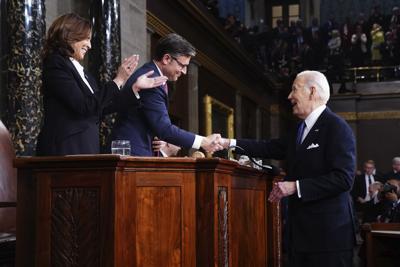WASHINGTON — President Joe Biden scolded Supreme Court justices to their faces Thursday night for their Dobbs v. Jackson Women's Health Organization decision that struck down national abortion protections in 2022 and gave individual states the right to restrict access to the procedure.
That abortion was the first domestic issue highlighted in Biden’s energetic 66-minute State of the Union address highlighted how large a role reproductive rights will play in the November elections, at which voters will choose the next president, many senators and all 435 members of the U.S. House.
“If you, the American people, send me a Congress that supports the right to choose, I promise you I will restore Roe v. Wade as the law of the land,” Biden said, seeming to stare at the justices sitting expressionless in their traditional black robes.
One of the dozens of invited guests representing an aspect of the controversy was Benjamin Clapper, whose New Orleans-based Louisiana Right to Life played a significant role in banning abortions in Louisiana as a result of the high court decision.
“It was remarkable that, at the start of President Biden’s talk, instead of focusing on the many issues that everyday Americans are facing, Biden’s first solution is more abortion,” said Clapper, who was invited by U.S. Sen. Bill Cassidy, R-Baton Rouge, to represent the pro-life movement. “I’d rather hear how Americans can come together to support moms and babies both before and after birth, rather than dividing us on abortion.”
Biden did touch on economics, crime, immigration, Ukraine, and Gaza. But the first subject was abortion, which has proven a potent political issue for Democrats.
In overturning Roe, the 6-3 majority in Dobbs rationalized returning power to the states by noting that women can influence legislative decisions through voting, lobbying, and running for office. “Women are not without electoral or political power,” the majority ruling stated.
Biden appropriated that language to explain why women voters helped turn an expected red tide in the 2022 congressional elections into a GOP House majority so narrow that little has been accomplished.
“Women are not without electoral, electoral or political power. You’re about to realize how much,” Biden said. “We’ll win again in 2024.”
Biden blamed his 2020 and 2024 rival, Donald Trump, for the restrictions.
True, Trump repeatedly has bragged about causing the Supreme Court’s decision to overturn Roe, noting he nominated three of the six justices in the majority. The other three were picked by Republican Presidents George H.W. Bush and George W. Bush.
Trump provided a running commentary on Biden’s speech on Truth Social. “He just screwed up his primary line of the evening, having to do with Roe v. Wade, while looking at the Highly Respected Justices of the Supreme Court, for whom it was intended!”
Since Dobbs, 14 states, including Louisiana, have banned abortions. Twenty-nine others don’t allow the procedure under various scenarios, such as how far along the pregnancy has progressed.
Voters in six states — including Republican strongholds like Kansas and Ohio — have backed constitutional amendments that favor access to abortion. As many as 13 states could put constitutional amendments dealing with abortion on their 2024 ballots, according to KFF, a Washington, D.C., health research foundation.
The issue has evolved beyond just access to abortions and now includes availability to over-the-counter birth control and in vitro fertilization, which often involves the destruction of embryos that the Alabama Supreme Court last month classified as persons.
Also entwined in reproductive-rights controversies: access to medication that causes abortions, and whether physicians can be jailed for providing care outside the procedures dictated in state abortion laws. The Supreme Court will issue opinions on both issues by June.
The galleries were packed with guests invited to represent various points that both parties wanted to make.
Sitting with first lady Jill Biden, for instance, was Kate Cox, a Dallas mother of two who had to go to another state for care because the Texas abortion ban precluded treatment even though her fetus had a fatal genetic condition that jeopardized her health.
As a lawyer and state representative before being elected to Congress, House Speaker Mike Johnson, R-Benton, drafted, edited or influenced most of the legislation that led to Louisiana’s ban on abortions. He frowned during much of Biden’s discussion on reproductive rights.
Among Johnson’s guests was Janet Durig, whose Washington pregnancy center “was one of the hundreds of pro-life centers or churches targeted and vandalized in 2022,” Johnson said. It's an issue he contends Biden has ignored.

